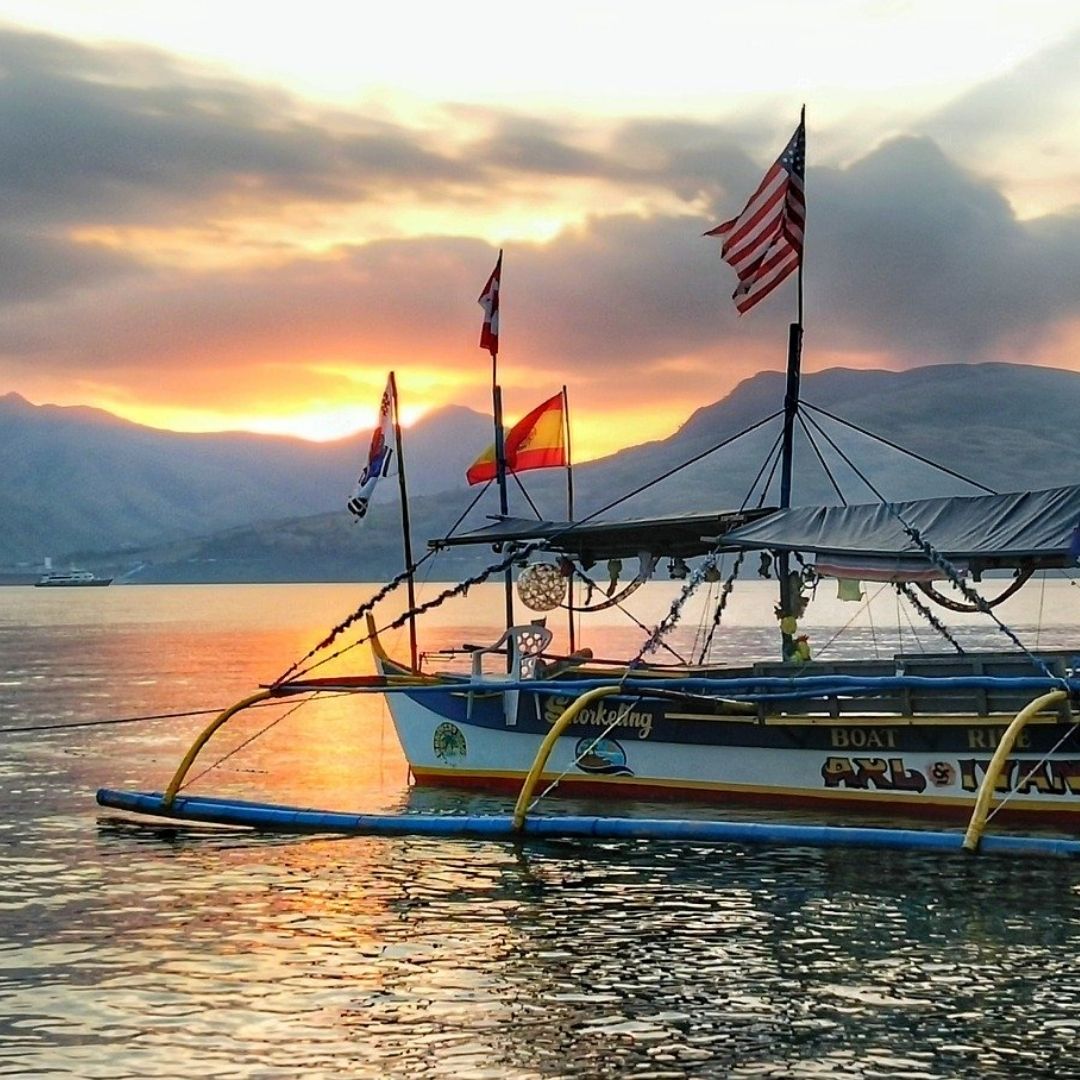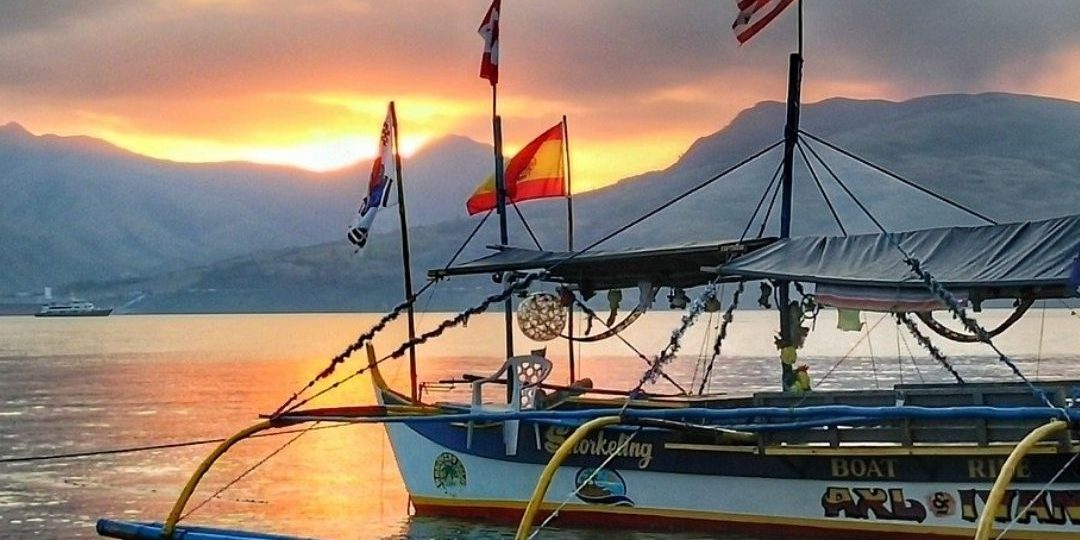Return to the Philippines
I was on a trip back to Manila after many years and renting a motel room in Quezon city. It was a simple, but clean room. At a small cafeteria just around the corner from my motel, I ate a good breakfast of rice, eggs and tinned corned beef. I headed out in the late morning in the hazy air to a sari-sari store that sold canned goods, cigarettes and cooking oil.
Across the street I watched some young men playing basketball in flip-flops on a home-made court. The Filipinos’ faith in destiny was displayed by a man in a yellow sleeveless shirt who sped by on his motorbike, transporting his care-free family with no helmets or restraints.
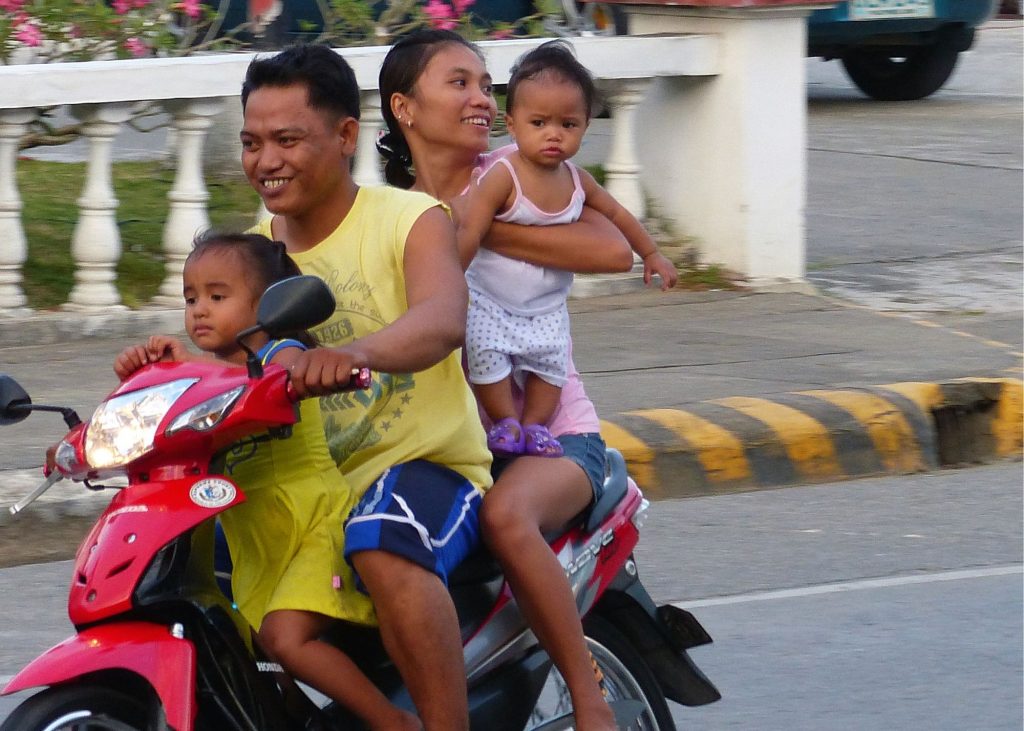
Later I met up with Romy, a Filipino friend from high school. It was cool to see him again. We stopped to eat at a nearby restaurant sat down at a rickety table in a corner of the restaurant. He talked to the waiter in Tagalog and ordered pansit—stir fried noodles—and some chicken adobo. The service was slow, but when the it finally came the portions were large, the food was flavourful and the wait was worth it.
“Take some more noodles,” Romy said passing me the bowl.
I looked around the small restaurant. On the wall was an ad for San Miguel Pilsen and a poster of the Filipino boxer Manny Pacquiao.
“He beat some name fighters from Mexico on the way up.” Romy said, when he saw me looking at the poster. ‘When he became light welterweight champion, millions of Filipinos danced in the streets and the president announced a national holiday. “
Romy dunked a cracker in his soup and bit off the soggy part. He leaned over the bowl and brought the spoon to his mouth, making a loud slurping sound.
For dessert we ordered some halo halo, a frozen Filipino dessert. I ate a sundae of shaved ice, sweetened red beans, a scoop of purple yam ice cream and toasted rice. I wasn’t crazy about halo halo but was always intrigued by the variety of textures with its chewey jellies and crunchy beans and refreshing shaved ice.
Romy took a drink of water and went on talking about Manny. “His family in Mindanao was real poor. All six of them lived in a one-room dirt floor shack. They’d collect dried, old bread, moisten and heat it up—and sell it. A lot of times they’d have only one meal a day. Mostly bananas and root crops. Sometimes they’d only have warm water for dinner. He left home at a young age so that his mother would have one less mouth to feed and slept in a cardboard box. It was tough going. Then he got into boxing. “
I told Romy I had read somewhere that Manny’s punching bag had been a bike tire wrapped around a banana tree, how he made two dollars a bout at local fiestas and illegal back alley fights to get money for his family.
Eventually he had to leave his family. At fourteen he stowed away on a boat. He lived on the streets of Manila where he sold donuts to get by. He started training in a gym and sleeping inside the boxing ring. He was too skinny during the weigh-ins for his first fights—so he put steel ball bearings in his pockets to make weight.
It was now early afternoon and Romy had driven to Old Manila. The back seat was littered with empty beer bottles and Jollibee cartons and a stale smell from previous meals permeated the car. Coming out from the aircon of the car I was hit by the humidity. We entered Intramuros, the medieval fort city built when Manila was the capital of the Spanish East Indies.
The walled city of stone was a beautiful part of Manila with its monasteries and convents, mossy walls and cobblestone streets. It was where the Spanish elite and mestizos had lived in homes decorated with lace curtains, Venetian mirrors and Chinese porcelain. There were moats and cannons to fend off colonisers and invaders. The fortified walls were built after the city was attacked and destroyed by a fleet of Chinese pirates. It was also looted by the British and invaded by the Dutch.
We had a look at the statue of King Carlos IV on Plaza de Roma. It was interesting to me that bullfights and other spectacles had been held in the plaza. Then we went to the San Agustin Church and checked out the tombs of Spanish conquistadors. At Fort Santiago, there was a shrine and museum to José Rizal, the Filipino poet and revolutionary hero.
He was imprisoned in the stone citadel, marched to a nearby field and executed by a firing squad of the Spanish Army. We retraced his last walk, following the bronze footsteps that led from his cell to the place of his execution. After our extensive visit to various monuments we decided take a ride in a horse-drawn cart.
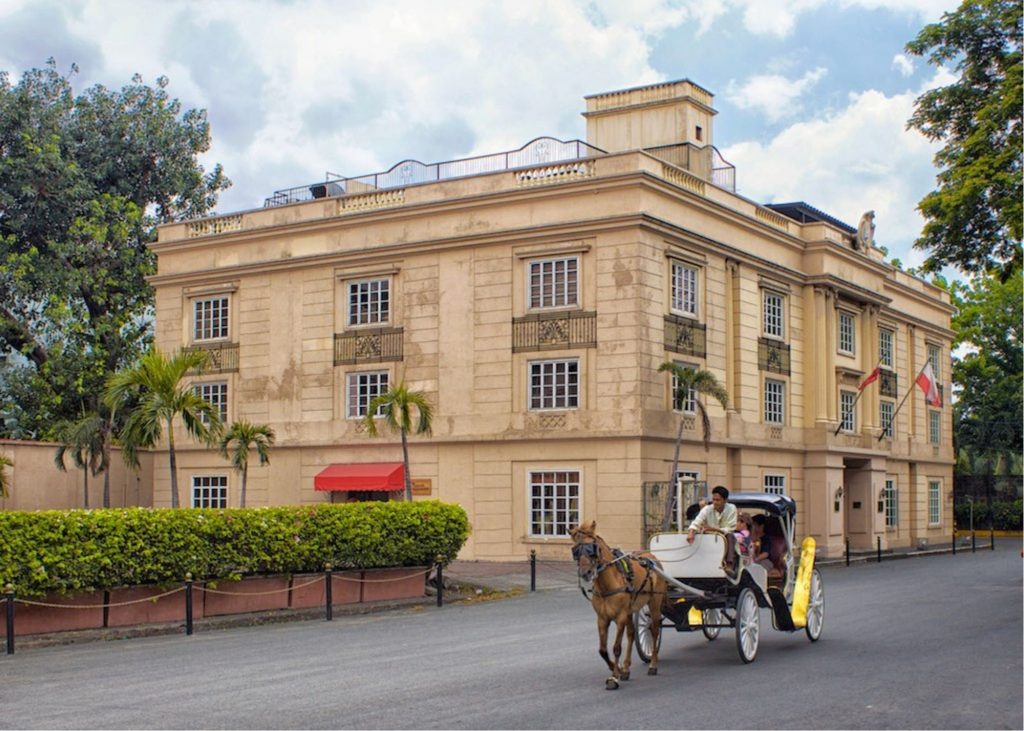
As we rode along, Romy captivated me with descriptions of the beauty of Old Manila. I was suprised by the details of what it was like back then. There were jazz clubs and cabarets. Regal women strolled with parosols by art deco buildings on tree-lined boulevard along Manila bay. The city was adorned with grand neoclassical buildings, a Boroque church and Spanish-style colonial homes.
“Back then it was the most beautiful city in Asia,” Romy said, proudly. Then he paused and said, “All of that was destroyed in the battle for the liberation of Manila.”
“During the Second World War,” he went on, “the city was pounded by US artillery fire, doused with gasoline by Japanese marines, set ablaze and razed to the ground.”
He told me some of the horror inflicted on the city. Japanese troops were dug in for a fight to the death. They booby-trapped buildings and civilians were trapped inside the scorched ruins of the walled city. The Japanese army slaughtered civilians in churches and prowled the wasted city, gang-raping women and slicing off their breasts, taking babies from their mothers and skewering them with bayonets. The starving civilians ate dogs and rats to survive.
“After Warsaw,” Romy said. “Manila was the most devastated city in World War Two. American troops had to take it back, street by street, house to house.”
I felt a strong sense of loss. I couldn’t imagine the sorrow that must’ve pervaded during that time, the lost lives, the lost past. The old ghosts—Manileños who lived through this dark period in history—still seemed to haunt the walled city and its beautiful monuments of the past.
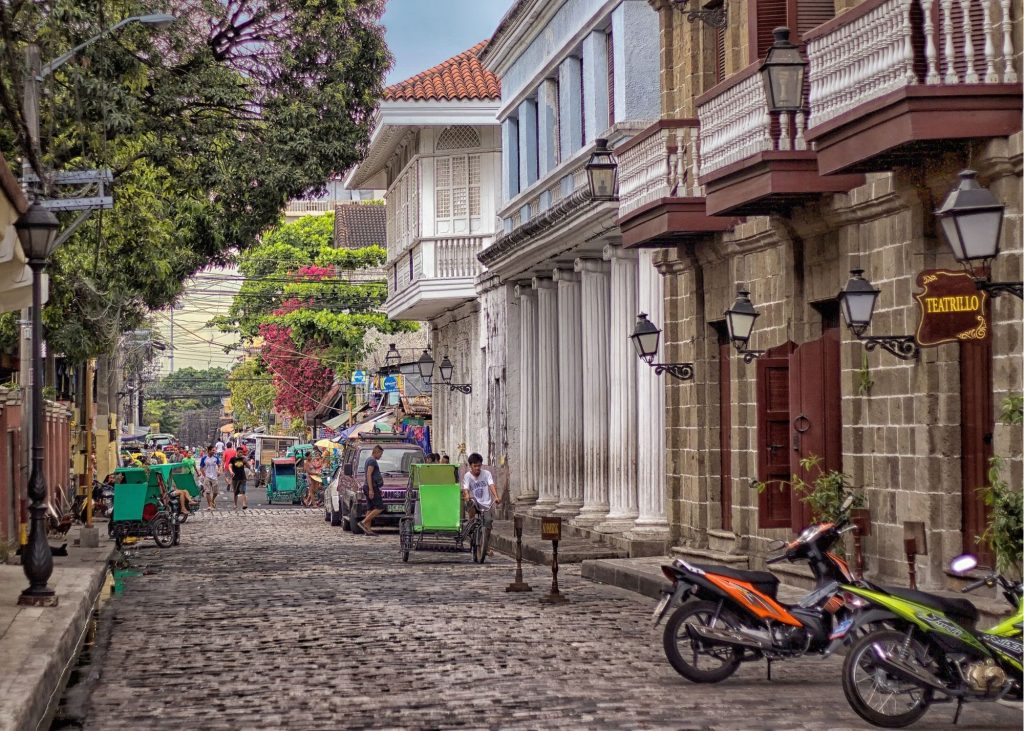
It was now getting dark. We decided to go meet Romy’s friend Anna at Hobbit House, the Tolkien-themed midget bar. As we walked along Arquiza street, a cockroach scurried across my path and climbed nimbly over the scabbed ankle of a man in rags sleeping near a doorway. A ladyboy stood under the corner street lamp. Its glowing light reflected off her sculpted cheekbones, highlighting the sultry almond-shaped eyes, and the fine features of a beautiful face. A filmy blue dress hugged her shapely, slender figure.
We walked into the bar decorated with carboard cut-outs of Frodo, Gollum and Gandolf. On the wall was a painting of the Green Dragon Inn scene from The Fellowship of the Ring. Manuel Legarda, the guitarist of Wolfgang, stood by the bar drinking a beer and talking to a friend. They were envelopped by the haunting carnival melody of the Doors coming from the stereo. The servers and bar staff were all friendly little people. Romy and I joined Anna at a table in a dimly lit alcove where a hobbit took our drink orders. Romy ordered a Flaming Frodo, a coconut liquor lit on fire. I ordered a sizzling plate of gambas.
The drinks arrived. We passed the time talking about random things. Anna mentioned a dive trip to Anilao. Romy then talked about an incident that happened in Ermita last weekend.
“So I’m just walking along with my beer, minding my own business. All of a sudden this paddy wagon pulls up and some cops get out. They tell me it’s against the law to walk down the street with an open beer. I’m like, come on, I didn’t know this so-called law.”
“So then what?” I asked.
“I was really stuck. Told them I’d spent all my money at the bar so I couldn’t pay the fine—or bribe—or whatever you call it. So they arrest me and take me to the station where a few cops are sitting around drinking beer and watching Lethal Weapon on TV. They let me ring Anna and tell her I’m in jail. I’m bragging out loud so the cops can hear, how I’m a rock ‘n roll outlaw like Keith Richards and do these cops know who I am…’cause I know the film actor Joe ‘Macho Man’ Garcia. Anna tells me to get off my high horse…and hangs up on me.”
I looked at her. “A bit harsh, don’t you think?”
“No. He was being such a pompous ass.” She turned to Romy. “What? Like knowing Joe gives you some sort of immunity for being a dumbshit?”
Romy ignored her and kept on talking. “After Anna hung up, I explained to the cops that I couldn’t get the bail money and would serve out my sentence. Funny thing is, they’re all apologetic, saying ‘sorry boss, but you can’t stay in jail because we have no food or water for you.’ They start going on about a Christmas bonus, and then I tell them I’ll call my uncle who’ll probably sort me out. So all the cops on duty pile into the paddy wagon and we road-trip down to my uncle’s. I give them the cash and we all go off to buy a few bottles of Tanduay. So later we’re all back at the station till morning, getting caned on rum and listening to Wolfgang on the stereo.”
